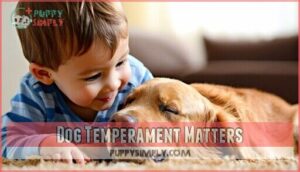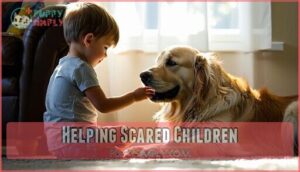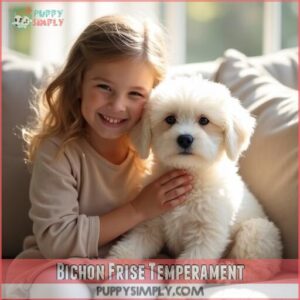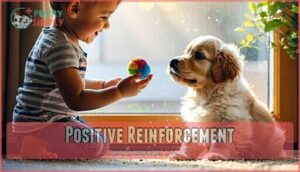This site is supported by our readers. We may earn a commission, at no cost to you, if you purchase through links.
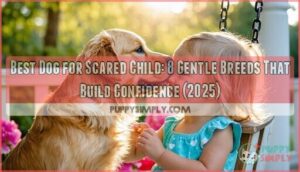
Breeds like Golden Retrievers, Cavalier King Charles Spaniels, and Bichon Frises are fantastic choices.
They’re gentle, patient, and naturally affectionate—basically, the teddy bears of the dog world.
A Golden Retriever’s steady temperament can make your child feel safe, while a Cavalier’s snuggly personality is perfect for soothing nerves.
Plus, these breeds are great at sensing emotions, almost like they’ve got a sixth sense.
With the right pup, you’ll watch your child’s fears melt away like butter on toast.
Table Of Contents
- Key Takeaways
- Choosing Best Dog Breed
- Dog Temperament Matters
- Helping Scared Children
- Suitable Dog Breeds
- Training and Socialization
- Frequently Asked Questions (FAQs)
- What breed of dog is best for a child with anxiety?
- Should I get a dog if my child is afraid?
- What is the best pet for a child with anxiety?
- What is the best dog for a sensitive child?
- What are the signs that my child is scared of dogs?
- How can I get my dog to be comfortable around kids?
- Is it possible to train a dog to be friendly with children?
- How can I tell if my dog is ill or injured?
- How to introduce a dog to new environments?
- What are signs a dog feels stressed?
- Conclusion
Key Takeaways
- Choose gentle, patient breeds like Golden Retrievers or Cavalier King Charles Spaniels, as they’re intuitive and great for building a scared child’s confidence.
- Focus on proper socialization between the dog and child to create positive associations and reduce fear.
- Match the dog’s temperament with your child’s personality to ensure a compatible and supportive relationship.
- Training and positive reinforcement are essential for creating a calm, child-friendly companion.
Choosing Best Dog Breed
You’ll find the perfect furry friend for your nervous child by focusing on breeds known for their gentle nature and intuitive understanding of emotions.
When you match your child’s personality with the right breed’s temperament, you’re setting up a friendship that can transform fear into confidence.
Golden Retriever Traits
Golden Retrievers bring sunshine into a scared child’s life with their gentle nature and unwavering loyalty.
Golden Retrievers light up a child’s world with their gentle hearts and unmatched loyalty, turning fear into lasting confidence.
Their exceptional trainability makes establishing boundaries easy, while their playful energy encourages children to come out of their shells.
Despite their size, Golden Retrievers provide family protection without intimidation—their sweet temperament perfectly balances safety with comfort for anxious little ones.
These furry therapists intuitively sense emotions, offering emotional support when your child needs it most, with their unwavering loyalty.
Labrador Retriever Features
When looking for a perfect companion for your scared child, the Labrador Retriever stands out from among all gentle dog breeds. Often called the "Nanny Dog" for good reason, these canines combine reliability with friendliness.
- Renowned for their gentle nature and infinite patience with children
- Possess balanced energy levels that match a child’s activity needs
- Maintain consistent breed popularity as America’s #1 family dog
- Excel in therapy roles for nervous children due to their intuitive nature
- Adapt easily to family routines while providing constant companionship
Poodle Characteristics
While Labradors excel with children, Poodles offer something special for scared kids.
These intelligent canines rank second out of 130 breeds for smarts, making them quick learners. Available in Standard, Miniature, and Toy sizes, all Poodles share the same playful personality and hypoallergenic coat.
They’re affectionate companions who love being part of family activities, and their bouncy, confident prance might just inspire your nervous child to feel braver too!
Irish Setter Temperament
While Poodles shine with their intelligence, Irish Setters steal hearts with their playful spirits and flowing red coats.
These gorgeous dogs are perfect for nurturing kids who need a confidence boost.
Irish Setters offer your family:
- Boundless affection that wraps scared children in emotional security
- Playful energy that encourages shy kids to open up
- Patient temperament despite their spirited nature
- Strong protective instincts without aggression
- Slow maturation that maintains their puppy-like charm for years
Dog Temperament Matters
You’ll find that a dog’s individual temperament matters more than its breed when helping your scared child overcome fears.
Just like people, every dog has its own unique personality, so you’ll want to meet potential furry friends multiple times before bringing one home.
Individual Dog Personality
While breed traits offer valuable insights, remember that each dog is truly one-of-a-kind.
A dog’s unique personality is shaped by genetic influence, early experiences, and their individual temperament.
When matching with a scared child, temperament testing reveals far more than breed alone.
Your child’s personality should complement the dog’s sensitivity level.
Heritability measures trait variation, showcasing the complex interplay between genes and environment.
I’ve seen shy kids bloom with patient dogs who seemed to instinctively understand their fears, which is a great example of a scared child finding comfort.
Breed Specific Traits
While considering individual personalities, understanding breed-specific traits can help you match the right dog with your scared child.
Each breed carries certain genetic tendencies that influence their behavior.
- Golden Retrievers and Labradors score high on breed intelligence and trustworthiness scales
- Small breeds like Bichon Frise offer manageable breed size without overwhelming anxious kids
- Cavalier King Charles Spaniels combine breed gentleness with moderate breed energy levels
Remember, breed patience often trumps other characteristics when pairing dogs with fearful children.
Socialization Importance
While breed traits provide a foundation, proper socialization makes all the difference for dogs living with fearful children.
The critical window for puppy socialization occurs between 8-12 weeks of age, when positive experiences shape their lifelong attitudes. Early participation in puppy training programs can be very beneficial.
| Socialization Stage | Key Focus | Benefits |
|---|---|---|
| Early Exposure (8-12 weeks) | Gentle child interactions | Prevents future aggression |
| Controlled Meetings | Supervised, calm interactions | Builds positive associations |
| Ongoing Practice | Regular dog-child interaction | Maintains comfort levels |
Remember, even the gentlest breed needs these experiences—I’ve seen perfectly sweet retrievers become nervous around kids simply because they weren’t properly socialized early on, which can lead to future problems and impact their ability to interact with fearful children in a positive manner, highlighting the importance of proper socialization and positive experiences.
Training Requirements
Everyone needs to understand that proper training is non-negotiable when bringing a dog into a home with a scared child.
You’ll want to start with basic obedience commands like "sit" and "stay," then progress to advanced training adapted to your specific situation.
Consider hiring a professional trainer who specializes in dog behavior if you’re unsure.
Remember, consistency importance can’t be overstated—all family members should use the same commands and rewards.
Helping Scared Children
You’ll see amazing changes in your scared child when you bring home the right furry friend, as dogs naturally build confidence through their unconditional love and protective nature.
The perfect canine companion creates a safe space where your child can gradually overcome fears and develop emotional strength.
Just like my shy nephew who now boldly introduces his Golden Retriever to everyone at the park, the right dog can make a significant difference in a child’s life, helping them to build emotional strength.
Building Confidence
Confidence blooms when a child feels secure around their furry companion.
Confidence grows when a child discovers safety and unconditional love in the gentle presence of their furry friend.
Dogs support scared children by becoming a bridge to emotional growth and social interaction.
- Golden Retrievers help kids overcome fears through their patience and gentle playfulness
- Regular care routines with dogs create a sense of secure attachment and responsibility
- Walking a dog together creates opportunities for positive social experiences with others
Using rewards effectively is key, as operant conditioning fundamentals can lead to good behavior.
Reducing Anxiety
A gentle furry friend can work wonders for anxious kids.
Dogs naturally reduce cortisol levels while boosting oxytocin increase in children.
When your child interacts with therapy dogs, you’ll likely notice improvements in psychological well-being and even school attendance.
Many parents report stronger peer relationships as their children gain confidence through their emotional support dogs.
The science is clear—dogs for anxiety aren’t just pets; they’re natural stress-busters for your worried little one.
Improving Social Skills
In the midst of daily dog interactions, your scared child can develop essential social skills that extend beyond the home.
Dogs act as social catalysts, breaking down barriers between shy kids and their peers.
Here’s how dogs help:
- They provide conversation starters for anxious kids meeting new friends
- They teach empathy development through understanding canine body language
- They build confidence through shared activities with other dog-loving children
Emotional Development
A dog’s gentle presence works wonders for your child’s emotional development.
Kids who interact with emotional support dogs show improved self-esteem and develop healthier attachment styles.
Your nervous child will learn emotional regulation by observing how their furry friend handles different situations.
Dogs create a judgment-free zone where shy kids can express feelings freely, building empathy through social interaction.
Plus, nothing melts fear in children quite like a wagging tail!
Suitable Dog Breeds
You’ll find that certain dog breeds naturally excel at helping scared children overcome their fears with their gentle, patient personalities.
When you’re looking for a furry confidence-builder, breeds like Beagles, Cocker Spaniels, Cavaliers, and Bichons offer the perfect blend of calm temperament and loving companionship that nervous kids need.
Beagle Characteristics
Now that we’ve explored how dogs can help scared children, let’s look at why Beagles might be your perfect match.
Beagles are friendly, small-sized scent hounds with smooth coats in various colors.
Their curious nature and sociable temperament make them excellent companions for timid kids.
Here’s why Beagles win hearts:
- Their goofy antics turn tears into giggles
- Their unwavering loyalty builds trust in anxious children
- Their endless curiosity encourages exploration
- Their high tolerance for noise and activity provides comfort
Beagles also need daily walks and playtime to stay happy.
Cocker Spaniel Traits
In the sphere of perfect companions for frightened children, Cocker Spaniels stand out with their irresistible mix of loyalty and gentle temperament.
Their medium size makes them ideal snuggling partners without overwhelming timid kids.
| Trait | Description |
|---|---|
| Size | Compact 13-15" tall, 20-30 lbs |
| Temperament | Gentle, easy-going, lively |
| Training | Highly trainable, keen to please |
| Grooming | Daily brushing needed |
| Exercise | Regular mental and physical activity |
These sensitive pups form loyal bonds that last a lifetime, requiring gentle treatment that matches perfectly with a scared child’s approach, making them perfect for providing gentle comfort and lifetime companionship.
Cavalier King Charles Spaniel
While Cocker Spaniels offer wonderful companionship, Cavalier King Charles Spaniels are like living teddy bears for scared children.
Their calming temperament makes them perfect companion dogs for nervous children. You’ll love how these affectionate pups shower everyone with love, making them ideal for child fear management.
They’re gentle, easy to train, and adapt well to any home environment. Just remember, despite their cuddly nature, they need regular health check-ups for heart concerns.
Bichon Frise Temperament
With their playful demeanor and extraordinary child affinity, Bichon Frises are a top pick for nervous children.
These little fluffballs are easy to train and thrive on love and attention.
Just keep an eye on playtime to guarantee their small size isn’t an issue.
As a beloved pet, their sweet dog breed temperament makes them perfect for scared kids.
- Gentle and patient with kids
- Easy to train and keen to please
- Small size requires monitoring during play
- Affectionate, forming strong bonds
Training and Socialization
Training and socializing your dog isn’t just important—it’s the secret sauce for helping your scared child feel safe.
With a little patience and the right techniques, you’ll turn your pup into a calm, confident companion your child can trust.
Desensitization Techniques
Start with gradual exposure—let your dog observe children from a safe distance.
Use calming signals like treats or soothing tones to reward relaxed behavior. Stress monitoring is key; never push too fast.
Create safe spaces where your dog feels secure. If fear persists, seek professional help.
Many owners find that anxiety relief options can assist in these situations. Desensitization works best with patience, positive reinforcement, and consistent dog-child socialization techniques.
Counter-Conditioning Methods
Counter-conditioning flips fear into trust by replacing negative feelings with positive ones.
Fear replacement works best with rewards. Here’s how:
- Pair scary situations with treats.
- Use gradual exposure, like soft sounds before louder ones.
- Build positive associations through play.
- Create a safe environment for practice.
- Reward calm behavior consistently.
Dog fear management thrives on patience and love! Consistent rewards are key to positive puppy training.
Positive Reinforcement
Positive reinforcement builds trust and affection with your dog.
Treat-based rewards, clicker training, and verbal praise work wonders, especially with gentle breeds.
Pair these with toy rewards for added fun.
For effective training, consider using high-value dog treats.
Dogs thrive on consistent reinforcement, so stay patient and nonsnappy.
Remember, training is a two-way street—your dog learns, and you bond.
Here’s a quick guide:
| Reward Type | Best For | Why It Works |
|---|---|---|
| Treats | Food-motivated dogs | Immediate satisfaction |
| Toys | Playful breeds | Adds excitement |
| Verbal Praise | All breeds | Builds trustworthiness |
Canine Good Citizen Certificate
Earning a Canine Good Citizen certificate shows your dog’s good temperament and training.
It’s also a stepping stone for therapy dog work.
The evaluation process includes:
- Testing requirements like obeying commands and staying calm.
- Training programs that teach good manners.
- Certificate benefits, such as proving responsible ownership.
It’s a win-win for you and your pup!
Frequently Asked Questions (FAQs)
What breed of dog is best for a child with anxiety?
A Labradoodle is like a warm hug with fur—gentle, intuitive, and great for anxious kids.
They sense emotions, calm easily, and love to play.
Opt for an adult Labradoodle for a calmer companion.
Should I get a dog if my child is afraid?
Getting a dog can help your child overcome fear, but take it slow.
Start with calm, gentle breeds like a Golden Retriever or Cavalier King Charles Spaniel.
Focus on socialization and let trust grow naturally.
What is the best pet for a child with anxiety?
A calm, intuitive pet like a Golden Retriever or Cavalier King Charles Spaniel works wonders for anxious kids.
Their gentle nature, patience, and cuddly vibes offer comfort and companionship, easing worries like a warm hug.
What is the best dog for a sensitive child?
Imagine a furry friend who feels your child’s emotions like a mirror.
A Golden Retriever, with its gentle heart and playful spirit, offers unmatched comfort, loyalty, and patience—perfect for sensitive kids needing a steady companion.
What are the signs that my child is scared of dogs?
Your child might freeze, cling to you, or avoid eye contact with dogs.
Watch for trembling, crying, or hiding behind objects.
They might also refuse to go near dogs or repeatedly ask if they’re safe.
How can I get my dog to be comfortable around kids?
Start by socializing your dog with calm, supervised interactions around kids.
Reward relaxed behavior with treats or praise. Gradually increase exposure, keeping it positive.
Patience and consistency are key—dogs need time, just like kids do! Consistency is crucial in this process.
Is it possible to train a dog to be friendly with children?
With patience and positive reinforcement, you can train a dog to be friendly with kids.
Socialize early, reward calm behavior, and create positive experiences.
Consistency is key—dogs thrive on clear expectations and love.
How can I tell if my dog is ill or injured?
Your dog’s acting off? That’s a red flag!
Watch for limping, appetite changes, excessive licking, or unusual behavior.
Check for swelling, wounds, or tenderness.
When in doubt, trust your gut—call the vet.
How to introduce a dog to new environments?
Ease your dog into new environments by starting with short visits.
Bring familiar items like toys or blankets for comfort.
Reward calm behavior with treats and praise.
Patience is key—don’t rush the process!
What are signs a dog feels stressed?
When a dog’s stressed, you’ll notice yawning, lip licking, or avoiding eye contact.
They might pace, whine, or tuck their tail.
Shaking off, like after a bath, is another subtle stress signal.
Conclusion
A dog can be the lighthouse guiding your scared child through stormy seas.
The best dog for a scared child isn’t just a pet—it’s a gentle companion with patience, love, and an uncanny ability to sense emotions.
Breeds like Golden Retrievers or Cavalier King Charles Spaniels can help build confidence, reduce anxiety, and brighten their world.
With the right pup and proper training, you’ll see your child’s fears fade, replaced by joy and trust.
- https://www.bodyandsoul.com.au/fitness/workouts/what-your-dog-says-about-you/news-story/f078afd8ea52d45838029a1930943214
- https://yourpetsathome.com/
- https://www.sciencealert.com/having-a-dog-can-reduce-anxiety-and-stress-in-children-study-finds
- https://www.ncbi.nlm.nih.gov/pmc/articles/PMC5645535/
- https://www.oodlelife.com/hyper-dog-breeds/?utm_source=oodlelife.beehiiv.com&utm_medium=referral&utm_campaign=the-best-dog-for-a-scared-child-9-breed-picks-photos


